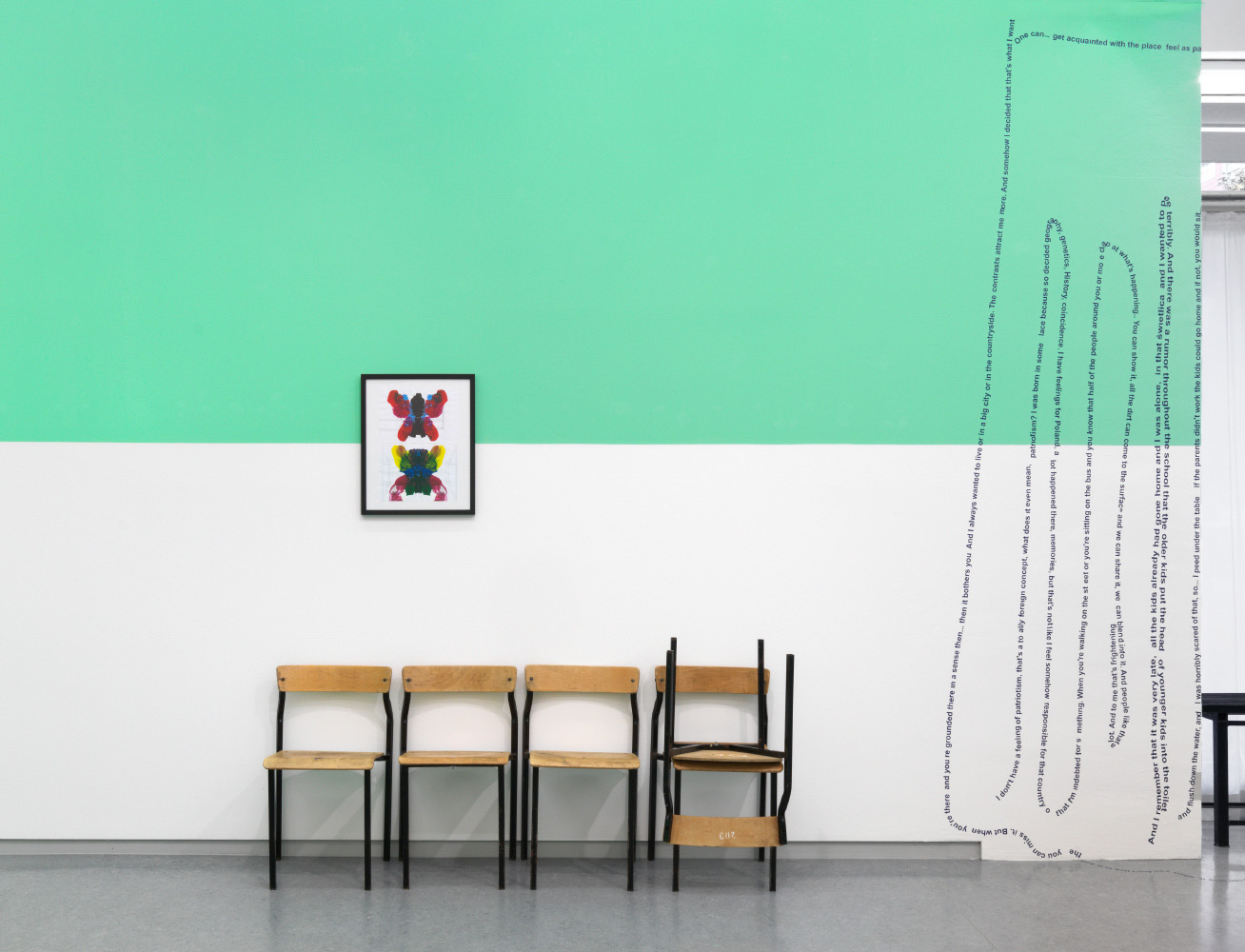Świetlica
curated by Wera Bet
CRISTINA FERREIRA-SZWARC
This exhibition is the result of a laborious and lengthy research process by the artist Cristina Ferreira-Szwarc around a dozen photographs. These show frozen places, strange rooms, and halls.
The first photograph outlines a spacious room with large windows, an empty stage and around it – a concentration of large rectangular tables with chairs. The tables drift in the room like islands. The chairs, perfectly stacked, create a puzzle to hold each other steady. This room begs to be freed from its own motionlessness. The next image shows another room with decorative red and white balloons hanging tensely from the ceiling. At the end of the room, the Polish state emblem appears, dividing it into two parts. Sorting through these images, we finally arrive at the last one, a black and white photograph. It commemorates the moment when one of these rooms is brought to life by people.
These places have many fleeting characters: one day they are the meeting grounds of amateur chess players or a daycare for children of working parents; the next day they host the election of the local mayor or a socio-therapeutic group; and in the end become a dance floor for those thirsty for amusement. The empty space stands still for a moment, before the cycle begins again.
The photographs belong to the collection of the artist, who traveled through Polish towns to find these places called świetlica, study them and understand what they are.
The exhibition is an attempt to recreate świetlica in the new context of the exhibition space. The project centers on interviews that the artist conducted with Poles living in Berlin. Through their memories, she attempts to reconstruct the social, emotional, or simply physical structure of the świetlica. In extensive interviews with a large group of people, the artist finds convergence for what a common room is. The common room is here a symbol of life in exile, the search for one‘s own community in order to feel at home again.
The common room can transform into a scenographic space, an empty stage that allows us to clarify how spatial structure affects social organization. Thus, Ferreira-Szwarc refers to Andrew Hewitt’s concept of social choreography – „linking dance and the aesthetics of everyday movement-such as walking, stumbling, and laughter-to historical ideals of social order”. Existing in any society is a performative action: entering into structures; navigating certain systems; finding one’s voice in collectivities; or creating alternatives. Ferreira-Szwarc understands the importance of the common room.
She was born and raised in Portugal. For the last 8 years Poland has become her home, where language conditions all aspects– emotional, social, cultural, bureaucratic. She moves on a certain common ground, both foreign and familiar, welcoming and amorphous. The common room is a territory of its own, a land created for temporary communities. But the świetlica is also a haunted leftover from the past, and a reminder of how history, heritage and architecture shape one‘s individual character. Ferreira-Szwarc builds her own commonality in KVOST, outlining the space with fragments of interviews displaced into poetic meaning.
So what is the świetlica? Is this a real physical place? Is it the little communities that inhabit it for a moment? Is it just a room? Utopia? Dystopia? Perhaps a heterotopia? A place that in its strange appearance and presence incompatibly disturbs, conflicts or transfigures. A place within worlds within worlds, mirroring and yet upsetting what is outside. Swietlica represents the stage of life where people are characters in our plays. So what is the swietlica for you, me? For us?
***
The artist Cristina Ferreira-Szwarc is the winner of the KVOST scholarship 2020.
The jury consisted of the artists Asta Gröting and Agnieszka Polska, as well as the curatorial team Nathalie Hoyos & Rainald Schumacher, who specialize in Eastern and Southeastern Europe, and the founding board members of the Kunstverein Ost, Julia Rust and Stephan Koal.
With their choice, the jury recognized the European, integrative orientation and the communal perspective of their project Świetlica (common room). Ferreira-Szwarc, who has lived in Poland since 2013, turns her gaze back to the everyday life of Polish immigrants who live in Berlin.
The artist-in-residence program in 2020 Berlin was canceled. Instead, the project received financial and organizational support from KVOST for a period of one year. The results of the scholarship will be presented at Berlin Art Week 2021.
Music by Wojtek Świeca







